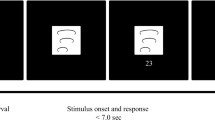Abstract
Double-coding refers to the simultaneous holding in declarative and procedural memory stores of information concerning the performance of a skill. Skill acquisition typically terminates in a stage of automatization during which declarative coding of “skill-relevant” information is lost or becomes irretrievable. It is argued that maintenance of both declarative and procedural knowledge relevant to skills and their performance permits unique metacognitive capabilities. It is argued further that these metacognitive capabilities are basic to constructive generation and utilization of such “skill-relevant” knowledge. Speculation is entertained concerning instructional means of helping learners to maintain double-coding of “skill-relevant” information, thus maximizing the constructive, metacognitive capabilities presumed to issue from such double-coding.
Similar content being viewed by others
References
Anderson, J.R. (1976). Language, memory and thought. Hillsdale, N.J.: Lawrence Erlbaum
Anderson, J.R. (1976). Cognitive psychology and its implications. San Francisco: W.H. Freeman.
Anderson, J.R. (Ed.). (1981). Cognitive skills and their acquisition. Hillsdale, N.J.: Lawrence Erlbaum.
Anderson, J.R. (1983). The architecture of cognition. Cambridge, MA.: Harvard University Press.
Bandura, A. (1977). Social learning theory. Englewood Cliffs, N.J.: Prentice-Hall.
Bereiter, C. (1985). Toward a solution of the learning paradox. Review of Educational Research, 55, 201–226.
Brand, M. (1984). Intending and acting: Toward a naturalized action theory. Cambridge, MA.: The MIT Press.
Brown, A.L. (1978). Knowing when, where, and how to remember. In R. Glaser (Ed.), Advances in instructional psychology (Volume 1, pp. 77–165). Hillsdale, N.J.: Lawrence Erlbaum.
Chi, M., Glaser, R., & Rees, E. (1982). Expertise in problem solving. In R. Sternberg (Ed.), Advances in the psychology of human intelligence (Volume 1, pp. 7–75). Hillsdale, N.J.: Lawrence Erlbaum.
Dreyfus, H.L., & Dreyfus, S.E. (1986). Mind over machine: The power of human intuition and expertise in the era of the computer. New York: Macmillan/The Free Press.
Ericsson, K.A., & Simon, H.A. (1984). Protocol analysis. Cambridge, MA.: The MIT Press.
Fitts, P.R., & Posner, M.I. (1967). Human performance. Belmont, CA.: Brooks/Cole.
Flavell, J.H. (1979). Metacognition and cognitive monitoring: A new area of cognitive-developmental inquiry. American Psychologist, 34, 906–911.
Flavell, J.H. (1985). Cognitive development (2nd ed.). Englewood Cliffs, N.J.: Prentice-Hall.
Fodor, J.A. (1980). Fixation of belief and concept acquisition. In M. Piattelli-Palmerini (Ed.), Language and learning: The debate between Jean Piaget and Noam Chomsky (pp. 142–149). Cambridge, MA.: Harvard University Press.
Frederiksen, N. (1984). Implications of cognitive theory for instruction in problem solving. Review of Educational Research, 54, 363–408.
Gagné, R.M. (1977). The conditions of learning (3rd ed.). New York: Holt, Rinehart & Winston.
Gagné, R.M. (1984). Learning outcomes and their effects: Useful categories of human performance. American Psychologist, 39, 377–385.
Gick, M.L. (1986). Problem solving strategies. Educational Psychologist, 21, 99–120.
Glaser, R. (Ed.). (1978). Advances in instructional psychology (Vol. 2). Hillsdale, N.J.: Lawrence Erlbaum.
Glaser, R. (Ed.). (1982). Advances in instructional psychology (Vol. 2). Hillsdale, N.J.: Lawrence Erlbaum.
Glaser, R. (1984). Education and thinking: The role of knowledge. American Psychologist, 39, 93–104.
Leinhardt, G. (1983). Novice and expert knowledge of individual student's achievement. Educational Psychologist, 18, 165–179.
Lynch, G. (1985). What memories are made of. The Sciences, September/October, 38–43.
Martin, J. (1984). Toward a cognitive schemata theory of self-instruction. Instructional Science, 13, 159–180.
Neisser, U. (1976). Cognition and reality: Principles and implications of cognitive psychology. San Francisco: W.H. Freeman.
Newell, A. (1973). Production systems: Models of control structures. In W.G. Chase (Ed.), Visual information processing (pp. 463–526). New York: Academic Press.
Newell, A., & Simon, H. (1972). Human problem solving. Englewood Cliffs, N.J.: Prentice-Hall.
Norman, D.A. (1980). Twelve issues for cognitive science. Cognitive Science, 4, 1–32.
Pascual-Leone, J. (1976). A view of cognitive from a formalist's perspective. In K.F. Riegel & J.A. Meacham (Eds.), The developing individual in a changing world: Vol. 1. Historcal and cultural issues (pp. 89–110). The Hague, The Netherlands: Mouton.
Pascual-Leone, J. (1980). Constructive problems for constructive theories: The current relevance of Piaget's work and a critique of information processing simulation psychology. In R.H. Kluwe & H. Spada (Eds.), Developmental models of thinking (pp. 263–296). New York: Academic Press.
Paivio, A. (1969). Mental imagery in associative learning and memory. Psychological Review, 76, 241–263.
Paivio, A. (1971). Imagery and verbal processes. New York: Holt, Rinehart & Winston.
Pellegrino, J.W., & Glaser, R. (1982). Analyzing aptitudes for learning: Inductive reasoning. In R. Glaser (Ed.), Advances in instructional psychology (Vol. 2, pp. 269–345). Hillsdale, N.J.: Lawrence Erlbaum.
Peterson, P.L., & Wallberg, H.J. (Eds.). (1979). Research on teaching. Berkeley, CA.: McCutchan.
Pressley, M., Borkowski, J.G., & O'Sullivan, J.T. (1984). Memory strategy instruction is made of this: Metamemory and durable strategy use. Educational Psychologist, 19, 94–107.
Pylyshyn, Z. (1984). Computation and cognition. Cambridge, MA.: The MIT Press.
Rosenshine, B. (1984, April). Instructional principles in direct instruction. Paper presented at the annual meeting of the American Educational Research Association, Toronto.
Ryle, G. (1949). The concept of mind. London: Hutchinson.
Simon, D., & Simon, H.A. (1979). A tale of two protocols. In J. Lockhead & J. Clement (Eds.), Cognitive process instruction (pp. 119–132). Philadelphia: Franklin Institute.
Sternberg, R.J. (1984). What should intelligence tests test? Implications of a triarchic theory of intelligence for intelligence testing. Educational Researcher, 13(1), 5–15.
Sternberg, R.J. (1985). All's well that ends well, but it's a sad tale that begins at the end: A reply to Glaser. American Psychologist, 40, 571–573.
Author information
Authors and Affiliations
Rights and permissions
About this article
Cite this article
Martin, J. Double-coding: a key to knowledge utilization and generation in the instruction and learning of skills. Instr Sci 16, 47–58 (1987). https://doi.org/10.1007/BF00120005
Issue Date:
DOI: https://doi.org/10.1007/BF00120005




